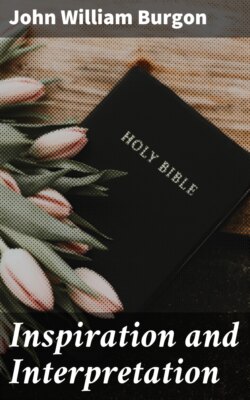Читать книгу Inspiration and Interpretation - John William Burgon - Страница 4
На сайте Литреса книга снята с продажи.
FOOTNOTES:
ОглавлениеTable of Contents
a
[1] The reader is invited to refer to the passages cited in the present volume, at pp. lxxxvii. and lxxxviii.
[2] See p. 47 to p. 50. Also Appendix (B.)
[3] In illustration of what is meant, may be particularized a highly objectionable Sermon which Dr. Temple preached before the University some years ago, and which occasioned no small offence to many who heard it—as all in Oxford well remember. It was almost as unsound as the same writer's Essay "On the Education of the World," which, to the best of my remembrance, it strongly resembled.—A printed Sermon by Dr. Temple may also be referred to, "preached on Act-Sunday, July 1, 1860, before the University of Oxford, during the Meeting of the British Association," entitled "The present Relations of Science to Religion."—Professor Jowett's handling of the Doctrine of the Atonement, needs only to be referred to.
[4] Page 80 to 82.
[5] "To the Reader," prefixed to Essays and Reviews.
[6] 'Neo-Christianity' in the Westminster Review, No. 36.—How true is what follows:—"The Bible is one; and it is too late now to propose to divide it. We shall only point out that the moral value of the Gospel teaching becomes suspicious when the whole miraculous element is discarded.
"We certainly do think that the Gospels assert a miraculous Incarnation, Resurrection, and Ascension; and that the Epistles teach Original Sin, and a vicarious Sacrifice. If this be doubted by our authors, it is sufficient for us to say that such is the impression they have created on all ages of Christians."
"We desire that if the Bible, or any part of it be retained as Holy Writ, it be defended as a miraculous gift to Man, and not by distorting the principles of modern Science. Let the Essayists be assured that there exists no middle course; that there is no Inspiration more than is natural, yet not supernatural; no Theology which can abandon its doctrines and retain its authority."
Lastly, with what sickening and almost Satanic power, does the same writer invite the Essayists and Reviewers to make shipwreck of their souls in the following terrible passage. And yet, who sees not that on their principles absolute and professed unbelief is inevitable? He says:—"How long shall this last? Until men have the courage to bury their dead convictions out of sight, and the greater courage to form new. All honour to these writers for the boldness with which they have, at great risk, urged their opinions. But what is wanted is strength not merely to face the world, but to face one's own conclusions. We know the cost. It must be endured. Let each who has thought and felt for himself, ask himself first what he does not believe, and then, if wise or needful, avow it. Next let him ask himself what he does believe, and pursue it to its true and full conclusions. Neither loose accommodation nor sonorous principles will long give them rest. It is of as little use to surrender the more glaring contradictions of Science as it is to evaporate discredited doctrine into a few vague precepts. That end will not be attained by our authors by subliming Religion into an emotion, and making an armistice with Science. It will not be obtained by any unreal adaptation; nor by this, which is, of all recent adaptations, at once the most able, the most earnest, and the most suicidal."
[7] The Bishop of Exeter to Dr. Temple.
[8] The Bishop of Manchester exactly expressed the general opinion, when he said—"Nor will I for a single moment, however my personal feelings might interfere, conceal my deliberate conviction that every partner in that work is equally guilty."—(Guardian, Ap. 10, 1861, p. 341.) But the most faithful language of all came from the Bishop of Exeter in his crushing reply to an inquiry put to him by Dr. Temple. "I avow that I hold every one of the seven persons acting together for such an object to be alike responsible for the several acts of every individual among them in executing their avowed common purpose."
[9] A letter from Dr. Rowland Williams, which has appeared in the newspapers, contains the following language with reference to the American reprint of "Essays and Reviews:"—"I confess myself personally gratified that my own work, and that of my far more distinguished coadjutors, with whom it is sufficient honour for me to be included in the same volume, should have obtained the honour of a reprint in another hemisphere. Still more would I hail the circumstance as an auspicious token of the sympathy which should prevail between kindred nations, as regards subjects of the highest import, and as a sign of the prospects of Christian freedom beyond the Atlantic. …
"I have not yet discovered any community or individual possessing the right to cast the first stone at those who interpret the Bible in freedom, and who subordinate its letter to its spirit, or its parts to its whole. Even if Holy Scripture were, as is popularly fancied, the foundation—and not, as I believe, the expression and the memorial—of Religious Truth in man, it would be absurd to render it honours essentially different from those which it claims for itself, or to make it a master, where it claims only to be a servant."
[10] Serm. V.
[11] See Sermon VII.
[12] Essays and Reviews, p. 166.
[13] See p. clxxvii. to p. clxxxiii.
[14] Mr. Jowett in Essays and Reviews, p. 433.
[15] Article XX.
[16] Essays and Reviews, p. 45.
[17] It should perhaps be stated that the edition of "Essays and Reviews" which I have employed is the Third (1860.)
[18] pp. 72–3.
